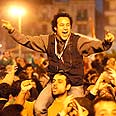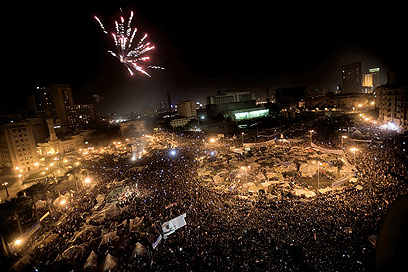
Egyptians celebrate into the night: 'Freedom is ours'
Hundreds of thousands in Cairo's Tahrir Square chant 'Mubarak is out' and 'Egyptians united.' Celebrator says protestors 'knew Mubarak was taking orders from the US,' calls on Obama to 'focus on his next term'; another says Mubarak's resignation prevented assassination
In Cairo's Tahrir Square, the symbol of the Egyptian uprising, hundreds of thousands continued to celebrate the resignation of President Hosni Mubarak well into the night - waving flags, singing songs in praise of the revolution and setting off fireworks.
"We feel free after 30 years, the dictatorship era has ended," one celebrator told Ynet overnight Saturday.
Cairo resident Ali Isa told Ynet, "Millions of people – men, woman and children – are at the square celebrating. They are all crying with joy and shaking hands." He said people were also waving signs reading "Mubarak is out" and "The Egyptian nation is united."
Ismailia resident Nawal Salum traveled to Cairo 18 days ago to take part in the mass protests against Mubarak's regime. "We need a democratic state that will allow all Egyptian citizens to voice their opinions," she told Ynet.
"It wasn't easy, but now we can see people in Egypt stomping on pictures of Mubarak and burning them."
Addressing US President Barack Obama's comparison between the uprising in Egypt and the revolutions sparked by Martin Luther King and Mahatma Gandhi, Salum said "he should stop with his nonsense, because the US took part in the destruction of Egypt. We all knew Mubarak was taking orders from the US on how to deal with his people.
"Obama should focus on his next term, we'll manage on our own. Just as we ousted Mubarak, we'll oust anyone who tries to harm the Egyptian people," she said.
Another protestor, Shawakat Hussein, said the fact that Mubarak transferred power to the Egyptian military saved him from being assassinated by protestors. "He became rich on the back of the Egyptian people and caused many families to live in hunger and poverty," he told Ynet.
Saturday morning saw burnt-out vehicles being towed away and Egyptian soldiers sweeping the streets and clearing barricades to open at least one road leading to Tahrir Square.
Protesters were divided. Some took down their makeshift tents and headed home. Others vowed to stay put until the military, which has pledged to shepherd reforms for greater democracy, issues a promised statement on its next steps.
Those could include the dissolving of parliament and creation of a transitional government.
"We have to see how the army will orchestrate a democratic transfer of power. We have to wait and see," said Ali Mohammed, a sales manager camped out on the square.
Under a banner reading "the people managed to oust the regime," two other protesters argued about whether to clear the downtown square near the famed Egyptian museum.
Shopkeeper Gomaa Abdel-Maqsoud says he's been in Tahrir Square since the protests began on Jan. 25 and is ready to go. He says "I have never seen such happiness in peoples' faces before; what else do I want?" he asked.
Nadal Saqr, a university professor, insisted protesters should stay until the army offers "clear assurances" that their demands for democracy are met.
Elsewhere, Egyptians in coffee houses and on the street scoured newspapers for details about the astonishing events from the day before _ when hundreds of thousands marched on Mubarak's palaces in Cairo and Alexandria and besieged state TV, leading the military to effectively carry out a coup at the please of protesters.
In a statement read out on national television, Egyptian military leaders said they would lift the country's emergency law but only "as soon as current circumstances end".

'We'll manage alone.' Tahrir Square (Photo: AFP)
The statement also said that the "Armed Forces make a commitment to caring for the people's legitimate demands, and to seeking to follow their implementation within the time frames with full precision and resolution, until the complete transfer of power, and the achievement of the democratic free society which the people aspire to."
The army pledged not to prosecute "the honest men who called for an end to corruption and for reform."
The Al-Arabiya network reported that the army plans to announce the dissolution of the government and parliament ahead of democratic elections.
At least 300 people were killed and thousands of others were injured during the uprising, which saw fierce clashes between security forces and anti-Mubarak protestors.
Mubarak's resignation was also celebrated in several other Arab states. Spontaneous rallies were held outside the Egyptian embassies and Jordan and Tunisia, while Lebanon's skies were lit up with fireworks set off by residents.
Iranian President Mahmoud Ahmadinejad said, "In spite of all the satanic schemes, with the help of God and the people's resistance, the new Middle East will turn into a region without the United States and the Zionist regime, and the arrogant powers will have no place in this Middle East. Soon, the entire world will experience the sweet taste of a world without Zionists and thugs."
German Chancellor Angela Merkel welcomed Mubarak's departure in the face of pro-democracy protests as "a historic change" and a "day of great joy."
But, Merkel said, "We also expect the future Egyptians governments will uphold peace in the Middle East and respect the treaties concluded with Israel, and that Israel's safety will be guaranteed."
EU foreign policy chief Catherine Ashton said on Friday she respects Mubarak's decision to stand down and called for dialogue for the formation of a broad-based government.
Meanwhile, at least 10 people died and 35 were wounded in clashes between Egyptian protesters and police in the north Sinai town of el-Arish on Friday, witnesses said.
Hundreds of people attacked the main police station using petrol bombs in the Mediterranean town near the border with Gaza in an attempt to free prisoners, before it was announced that President Hosni Mubarak had stepped down.
Three of those who died were policemen. Police evacuated the building, which was partly destroyed by fire, and prisoners managed to escape. Five police vehicles were set on fire.
Yitzhak Benhorin, Attila Somfalvi, Roee Nahmias, Reuters and AP contributed to the report
- Follow Ynetnews on Facebook










